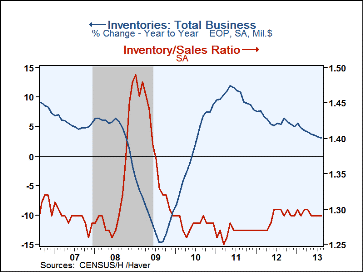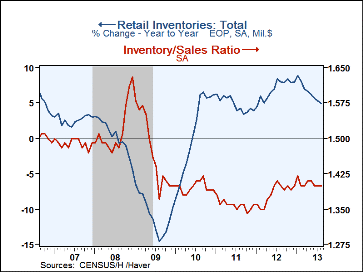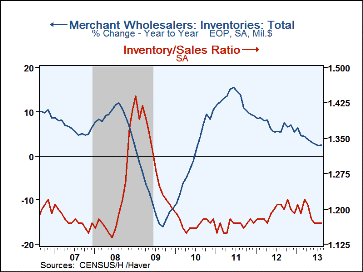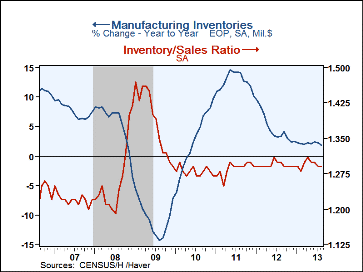 Global| Oct 30 2013
Global| Oct 30 2013U.S. Business Inventories Rise Moderately
by:Tom Moeller
|in:Economy in Brief
Summary
Total business inventories increased 0.3% during August (3.1% y/y) following a 0.4% July rise. The figure was accompanied by a 0.3% gain (4.2% y/y) in business sales which came after a 0.6% July increase. As a result, the inventory- [...]
Total business inventories increased 0.3% during August (3.1% y/y) following a 0.4% July rise. The figure was accompanied by a 0.3% gain (4.2% y/y) in business sales which came after a 0.6% July increase. As a result, the inventory-to-sales ratio remained unchanged at 1.29, where it's been for the last year.
In the retail sector, inventories increased 0.3% (5.0% y/y) as motor vehicle inventories gained 0.2% (8.3% y/y). Inventories excluding autos rose 0.3% (3.5% y/y). Inventories of furniture, electronic and appliances fell 0.3% (-2.8% y/y) but food & beverage stores inventories slipped just 0.1% (+2.3% y/y). Apparel store inventories also slipped 0.1% (+2.0% y/y). General merchandise inventories ticked up 0.1% (4.5% y/y) and building material stores inventories rose 0.4% (2.6% y/y. The retail inventory-to-sales ratio held at 1.40.
Merchant wholesale inventories increased 0.5% (2.5% y/y). The y/y gain remained down sharply versus the prior two years. Restraint continues in both durable and nondurable good industries. The inventory-to-sales ratio held on to its earlier decline. Factory sector inventories rose 0.2% (1.9% y/y). The inventory-to-sales ratio held m/m at 1.29.
Business sales rose 0.3% (4.2% y/y) led by a 0.6% rise (5.6% y/y) in wholesale sales. Retail sales increased 0.2% (4.7% y/y) while sales less autos were unchanged (3.1% y/y). Shipments by the factory sector improved 0.2% (2.7% y/y).
The manufacturing and trade data are in Haver's USECON database.
| Business Inventories (%) | Aug | Jul | Jun | Aug Y/Y | 2012 | 2011 | 2010 |
|---|---|---|---|---|---|---|---|
| Total | 0.3 | 0.4 | 0.1 | 3.1 | 5.1 | 7.9 | 8.8 |
| Retail | 0.3 | 0.8 | 0.1 | 5.0 | 8.0 | 3.9 | 6.2 |
| Retail excl. Motor Vehicles | 0.3 | 0.8 | -0.1 | 3.5 | 3.2 | 3.6 | 4.1 |
| Merchant Wholesalers | 0.5 | 0.2 | -0.2 | 2.5 | 5.5 | 9.2 | 10.5 |
| Manufacturing | 0.2 | 0.3 | 0.2 | 1.9 | 2.4 | 10.2 | 9.8 |
| Business Sales (%) | |||||||
| Total | 0.3 | 0.6 | 0.2 | 4.2 | 4.4 | 11.0 | 9.7 |
| Retail | 0.2 | 0.4 | 0.8 | 4.7 | 5.1 | 7.7 | 5.8 |
| Retail excl. Motor Vehicles | 0.0 | 0.7 | 0.3 | 3.1 | 4.5 | 7.1 | 4.6 |
| Merchant Wholesalers | 0.6 | 0.0 | 0.4 | 5.6 | 4.3 | 12.8 | 12.1 |
| Manufacturing | 0.2 | 1.1 | -0.3 | 2.7 | 4.0 | 12.1 | 11.0 |
| I/S Ratio | |||||||
| Total | 1.29 | 1.29 | 1.29 | 1.30 | 1.29 | 1.27 | 1.28 |
| Retail | 1.40 | 1.40 | 1.40 | 1.40 | 1.38 | 1.36 | 1.40 |
| Retail Excl. Motor Vehicles | 1.22 | 1.22 | 1.22 | 1.23 | 1.22 | 1.23 | 1.26 |
| Merchant Wholesalers | 1.17 | 1.17 | 1.17 | 1.21 | 1.19 | 1.17 | 1.17 |
| Manufacturing | 1.29 | 1.29 | 1.30 | 1.39 | 1.29 | 1.29 | 1.28 |
Tom Moeller
AuthorMore in Author Profile »Prior to joining Haver Analytics in 2000, Mr. Moeller worked as the Economist at Chancellor Capital Management from 1985 to 1999. There, he developed comprehensive economic forecasts and interpreted economic data for equity and fixed income portfolio managers. Also at Chancellor, Mr. Moeller worked as an equity analyst and was responsible for researching and rating companies in the economically sensitive automobile and housing industries for investment in Chancellor’s equity portfolio. Prior to joining Chancellor, Mr. Moeller was an Economist at Citibank from 1979 to 1984. He also analyzed pricing behavior in the metals industry for the Council on Wage and Price Stability in Washington, D.C. In 1999, Mr. Moeller received the award for most accurate forecast from the Forecasters' Club of New York. From 1990 to 1992 he was President of the New York Association for Business Economists. Mr. Moeller earned an M.B.A. in Finance from Fordham University, where he graduated in 1987. He holds a Bachelor of Arts in Economics from George Washington University.










